In our household my husband and I share our responsibilities [cooking, cleaning etc] fairly evenly, however we’re a little old school with maintenance and repairs; he enjoys tinkering with tools and does a better job than I could [and I get stuck grocery shopping most the time].
I used to be his helpful assistant until E took over my role. The jobs may take a little longer and dad sometimes gets a tad frustrated when E is being stubbornly [un]helpful and challenging, but we recognise and appreciate this important learning opportunity for our son.
Being able to create or repair something with your bare hands is hugely satisfying and my husband is grateful that he has the skills needed to take care of our home, skills he learnt from his father as they worked on a range of projects together during his childhood. It is this tradition and skill set my husband wants to instil in our son as they work together taking care of the house.
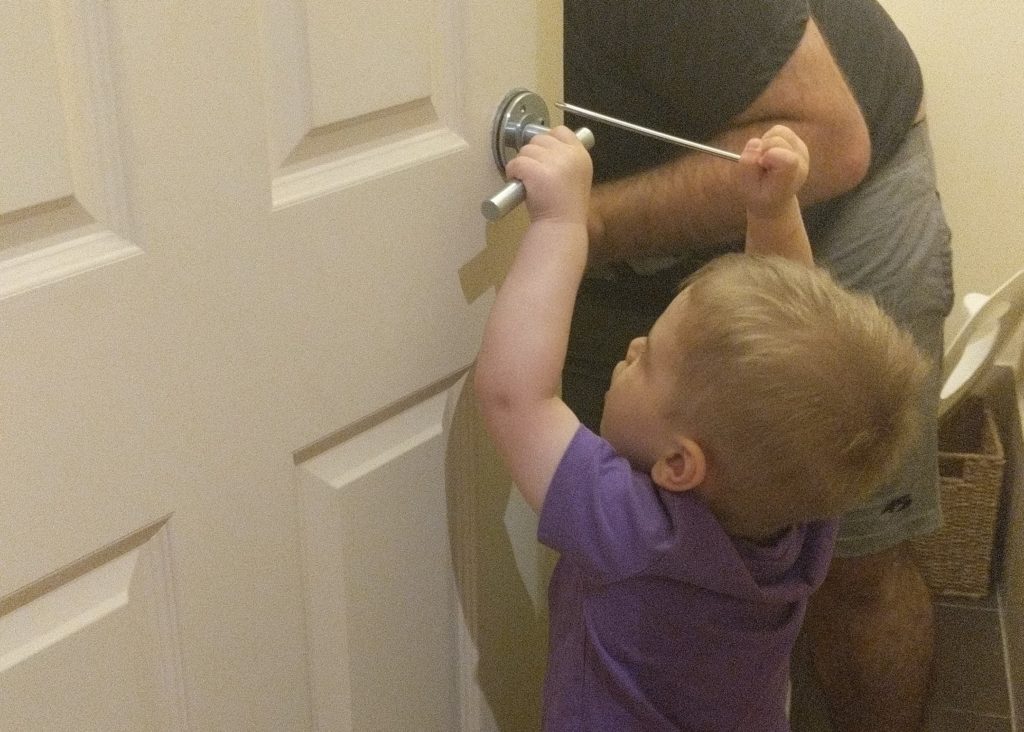
A lot of people fear their children getting hurt using tools and this is of course something we’re cautious of, however learning to use tools with a supervising adult is a great way for children to learn safe practices. E has his pretend tools to role play with, but its the heaviness and real function of dad’s tools that make them an incredible learning resource. When E holds the drill his dad reminds him to hold it tight as it will hurt his feet if he is silly or careless and drops it. Using a screwdriver his dad reminds him that it will hurt if he pokes someone, especially if he pokes their eyes. E is like any child and will inevitably test the rules, but proper supervision helps prevent any real harm from occurring as we reinforce the rules, learn to recognise risks and practice reasoning.
Our household Rules for using tools with dad:
- ALWAYS listen to dad [and mum or other supervising adult]
- ALWAYS walk when holding or working around tools
- ALWAYS hold the tools firmly
- ALWAYS act sensibly with the tools
- ALWAYS be safe with the tools and remember they could hurt someone if misused
- ALWAYS keep the tools pointed away from your body and a safe distance from other people
- ALWAYS pay attention
Living in a throw-away society it is important to my husband and I that our son be educated on the importance of maintaining and repairing. We are by no means poster children for sustainable living, but we endeavour to be as kind to our environment as possible.
Surely we have a responsibility to leave for future generations a planet that is healthy, inhabitable by all species.
Sir David Attenborough, On Wings of Waste
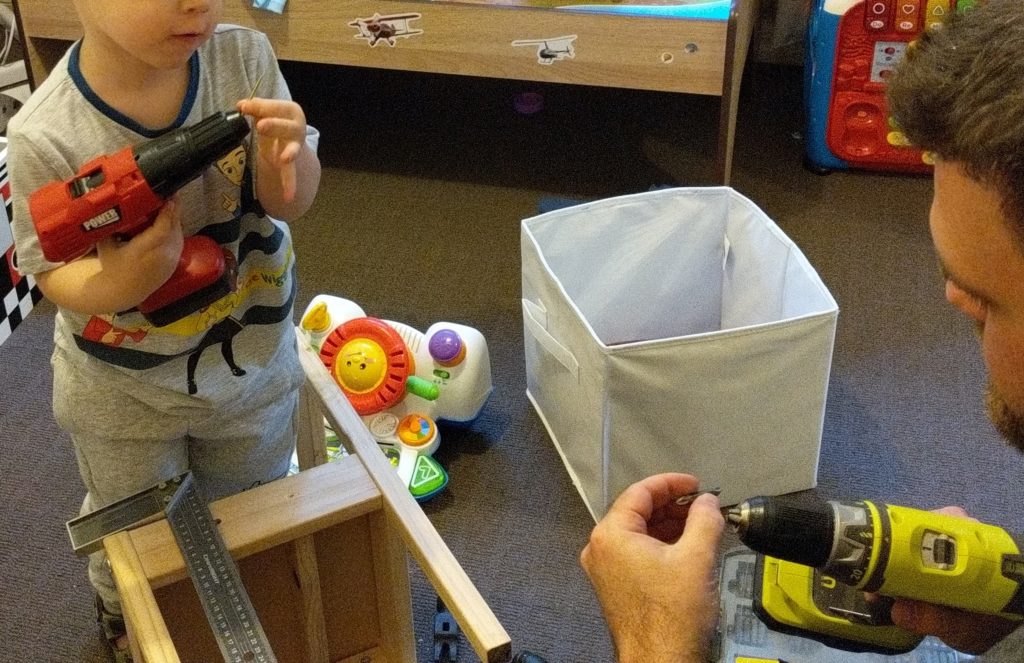
Instead of replacing E’s chair when it broke my husband invited E to help repair it by removing the broken panel, fitting some structural beams to make it stronger, and fitting a new panel. As expected when working with a two year old, E had some ideas of his own that led to discussion, negotiation, compromise and firm directions from dad.
Using tools can promote/support a range of skills and developmental areas:
- Gross and fine motor; strength, large body movements, balance, coordination, pincer grip, precision
- Cognitive skills; patience, problem solving, concentration, cause and effect, trial and error, persistence/resilience, planning
- Social skills; building/nurturing relationships and trust, sharing in sense of pride of accomplishment and happiness, cooperation, team work, communication, turn taking, safety and concern of others
- Mathematical skills; design, patterns, shapes, numeracy/numbers, measurement, weight

I occasionally set up intentional opportunities for E to practice his handyman skills, as there is not a continuous supply of broken down or in need of maintenance items around the house. On this occasion I used a screwdriver to pierce some holes into a cardboard box and inserted some wood dowels. E used his hammer to bang them in and collected them back up as they fell through to the floor.
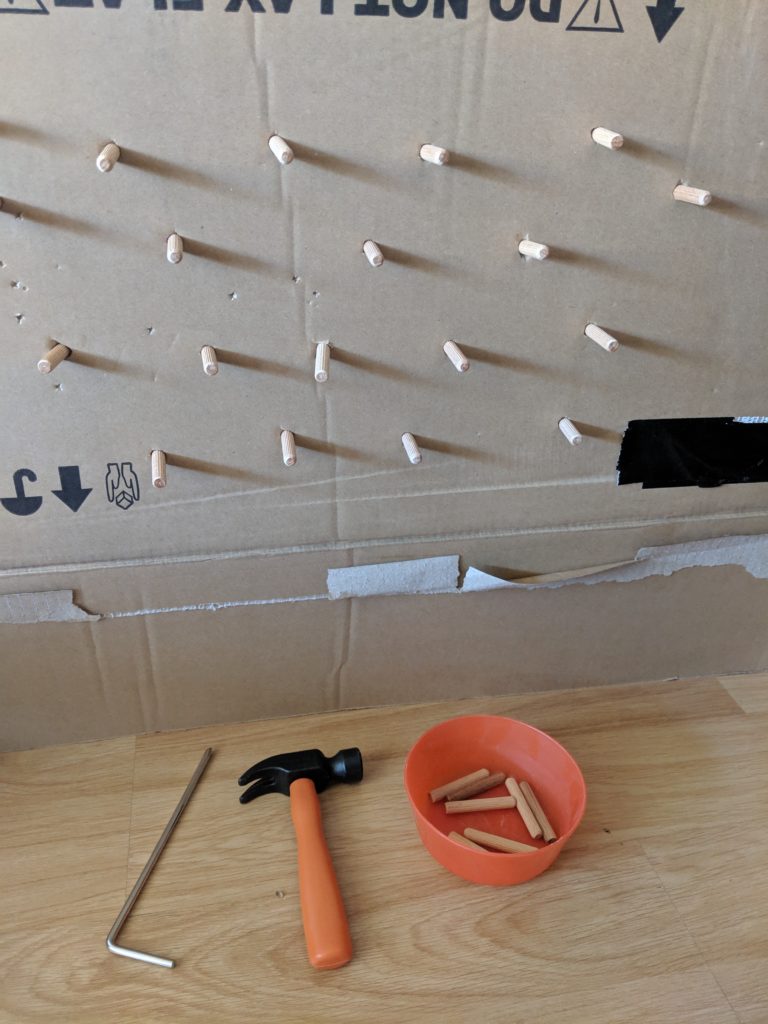
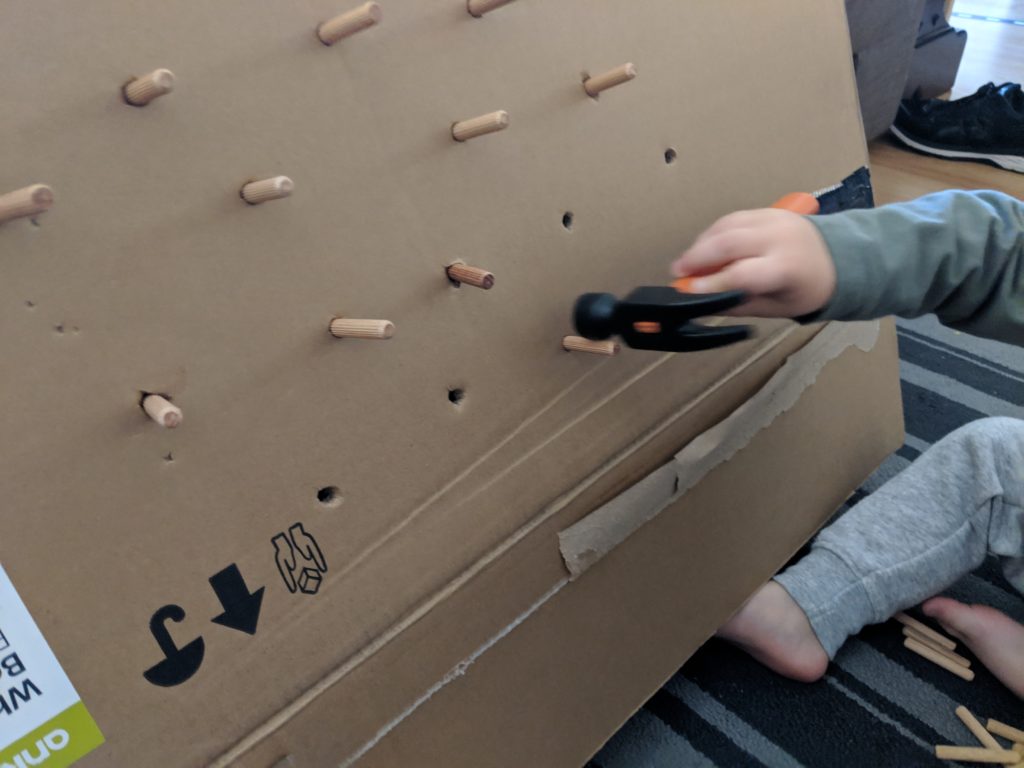
E enjoyed this for some time, however he became more intrigued by the challenge of piercing the holes. E and I started to have a spirited debate over him using the screwdriver for such a purpose until I conceded realising my stubbornness was hindering his investigation. E held the screwdriver with one hand and tried with all his might to push the metal through the cardboard. This proved difficult so he problem solved, applying his other hand to push with more force. With a lot of energy and determination expressed in his face E succeeded in piercing a hole,
“I did it!”
E.
Had I not conceded and allowed E to copy me [I really did not have a valid reason why he couldn’t poke the holes himself] I would have deprived him of this achievement.
A lesson I learnt years ago from a more experienced educator was to pick my battles with children. She delicately explained that in life children will challenge us over almost everything and it is our responsibility as adults with the ability to reason and negotiate, to evaluate which times we need to stand strong in our decision and when we can concede. A good way to decide this is to anticipate the negative outcomes of their choice and consider the positives. If the repercussions are likely low and the benefits are high then it’s probably a suitable time to concede; sometimes our default response as adults is no and we really have to decide if we even have a valid reason. If there are obvious and real dangers then stand your ground and deal with the inevitable tantrum with understanding and kindness creating a safe space for your child to express those big emotions. Children as clever as they are are still growing the brain path ways that help them regulate their emotions and responses; it is important we do not join them in their heightened emotional response, that we instead remain calm and accessible for when they are ready to find their composure.
“When little people are overwhelmed by big emotions, it’s our job to share our calm, not to join their chaos.”
L. R. Knost
This approach has been extremely beneficial to me over the years and I cannot promote it more, for your child’s development and your own sanity.
Children need to have a say in important decisions in their lives and learn how to evaluate the risks of their situations [supported wherever necessary by a caring adult]. They also need to learn that sometimes no means no; whenever no is the answer please explain to your child why. Children need to be spoken to with respect and dignity, a clear explanation of your reasoning helps children to understand why you have made that choice [that you’re not in autopilot saying no but that you have given it lots of consideration] and this helps build their own ability to reason and supports them as they learn to self-regulate.
Children in the middle of a heightened emotional response cannot hear you [their ears may as well be painted on], nor do they have the ability to reason in this state of mind. Please wait until they have found their calm before trying to have a conversation. Stay close by, reassure them with a soothing ‘I’m here when you’re ready to talk’, ‘when you are calm we can have a hug and talk about how you’re feeling’ and maybe if they’ll allow it, a gentle reassuring touch to the arm or shoulder. Perhaps your child has a soft toy or blanket they may find comforting, offering this to them is a kind way to show respect to their feelings and support them to regulate their response. Just because we are standing firm in our decision to say no or not now, does not mean we have to be cold and punishing to our children, they are human beings with valid thoughts and feelings.
“Here’s the thing, effective parenting and, more specifically, effective discipline, don’t require punishment. Equating discipline with punishment is an unfortunate, but common misconception. The root word in discipline is actually disciple which in the verb form means to guide, lead, teach, model, and encourage. In the noun form disciple means one who embraces the teaching of, follows the example of, and models their life after.”
L.R. Knost, The Gentle Parent: Positive, Practical, Effective Discipline
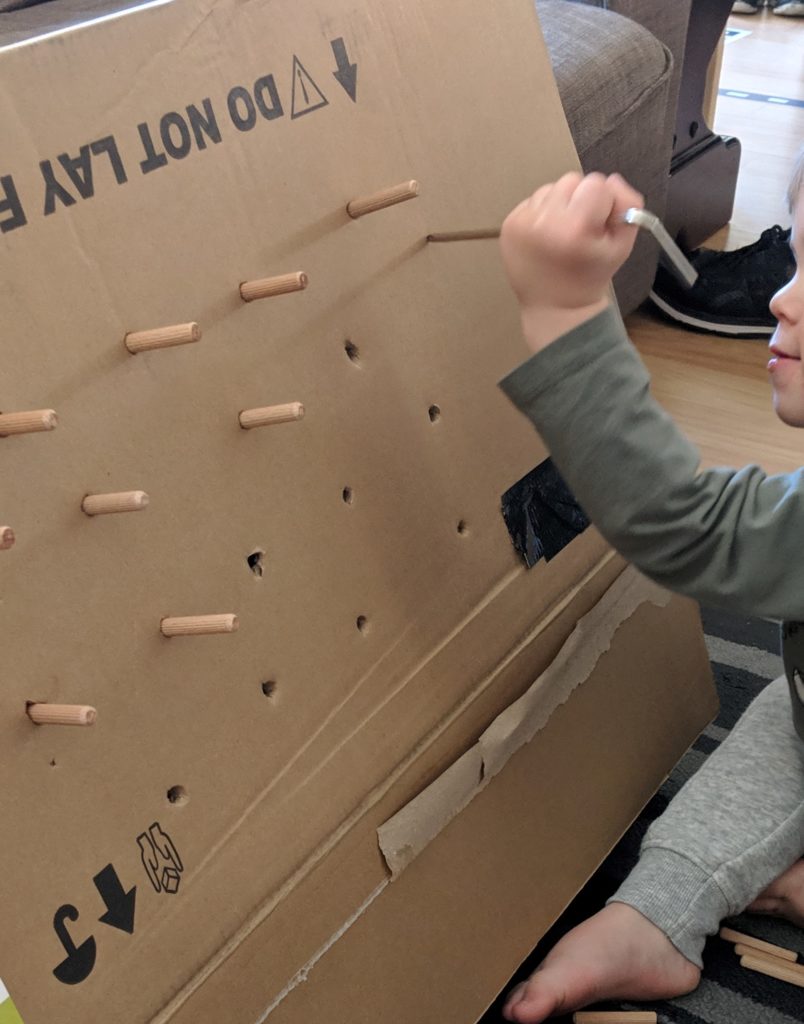
The time E spends learning to repair and maintain things around the house with his dad and practising those skills with me during intentional teaching moments are instilling in him a solid foundation for his future, especially when he challenges us and explores his ability to reason and negotiate. He will not only learn to be a resourceful, practical, capable man with the skills to look after himself and his family home, but he will also be kind, understanding and fair with the ability to manage his feelings.
Please be kind and respectful to the children in your lives as they challenge you, question you, express their big feelings, and test out their own ideas; sometimes we just need to say yes?
L.R. Knost, Two Thousand Kisses a Day: Gentle Parenting Through the Ages and Stages
“Instead of raising children who turn out okay despite their childhood, let’s raise children who turn out extraordinary because of their childhood.”

I really love the idea of teaching children we can repair broken things instead of throwing them away 🧡 such an important lesson for a sustainable future!